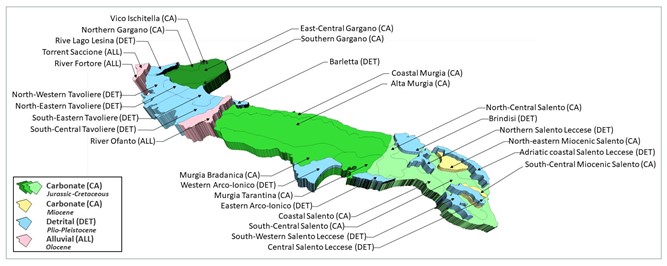
The characterization of the groundwater bodies of the Apulia Region carried out in 2013 and integrated in 2015, highlighted that the main problems that contribute to defining the risk of not achieving a good status are generally linked to saline contamination and threshold exceeding of some parameters (i.e. Cl, NO3, Fe, Mn, Se). This finding arose the need of establishing whether these exceedances are related, in whole or in part, to the geochemical characteristics of the aquifers or anthropic activity. In other words, the need emerged of determining the natural background levels (NBLs), defined as the concentration of a substance or the value of an indicator in a groundwater body corresponding to the absence of anthropogenic alterations or the presence of extremely limited alterations to undisturbed conditions
In 2018, the Water Resources Department of the Apulia Region, within the frame of the Regional Operational Program (ROP) E.R.D.F.-E.S.F. 2014/2020, Action 6.4 - Activity 6.4.1: “Supporting the introduction of innovative water-savings measures, treatment for polluting loads containment, ecosystemic approach for recovering degraded water bodies”, funded the VIOLA project – “Natural background values for the groundwater bodies of Apulia” to fill this information gap.The VIOLA project, a three year duration project, should have ended in December 2020. However, due to the COVID-19 pandemic, the Water Resources Sector of the Apulia Region granted a one-year extension.
The activities of the VIOLA project have been distributed in several Tasks, grouped into four Work Packages related to:

The project includes:
Six IRSA-CNR researchers, as well as research fellows, took part in the VIOLA project, from both the department of Bari and Rome, bringing
into the project hydrogeological, hydro-chemical, microbiological and engineering skills.
During the project, the IRSA-CNR cooperated with the
Institute of Geosciences and Georesources of the CNR, the Polytechnic and the
University of Bari, public bodies and local experts and worked in coordination with the
Regional Agency for Irrigation Activities and Forestry of Puglia (ARIF) for field activities.